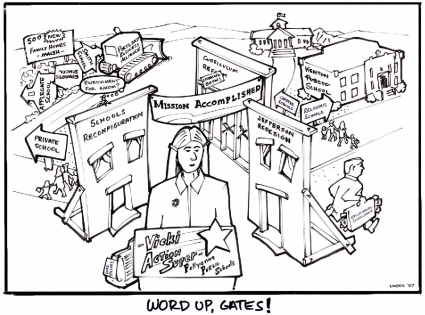Portland Public Schools (like the Winter Hawks) are at a turning point. In many ways, the Portland District seems near collapse. Glaring funding inequities plague the poorest neighborhoods of Portland, with public schools closed and merged and buildings leased out to the highest parochial school bidder. Schools are segregated economically and racially — especially in middle and high schools — to a degree disproportionate to neighborhood populations.
The causes of this are threefold and self-reinforcing. Funding, which I’ve addressed at some length here before, has been largely out of PPS policy makers’ hands. But available funding is not distributed equally among neighborhoods.
Second is the district’s liberal school choice policy, which allows middle class families to flee their “failing” neighborhood schools. Since schools are funded on a per-student basis, this means that over time district funding has shifted dramatically to wealthier neighborhoods. Capture rates of under 50% are common in poor neighborhoods, while schools like Grant and Lincoln are packed to the gills.
As schools in working class neighborhoods become disproportionately filled with poorer children, whose families can’t afford to transport their children across town, test scores go down, and even more families transfer out. Principals use what discretionary money they have not for music and art, but for literacy help, since their populations have a disproportionate need. Better-off families see schools in other neighborhoods with art, music and P.E. and see little choice but to transfer. Hence the cycle fuels itself, leaving many schools in a death spiral they cannot escape without major transfer policy change.
Finally, recent grant-funded efforts to “fix” the schools in poorer neighborhoods in the mold cast by the Gates and Broad Foundations have done nothing but encourage this flow of students and funding out of neighborhoods in North and Northeast Portland. Rushed closings and reconfiguration have particularly fouled up the Jefferson cluster, making it even less likely to attract neighborhood families. (Again, I’ve covered this before).
Forget K-8; there’s no way we can offer our middle schoolers the choices they need in K-8 schools. Vicki Phillips’ assertion that K-8 would lead to more music for middle schoolers is absurd. Unless she means sixth, seventh and eighth graders sharing a half-time general music teacher with the elementary kids.
Forget “academies”.
We need to turn quickly and decisively away from the recent failed experiments in corporate foundation-sponsored reconfiguration. This direction has only made the problem worse. (If we keep trying the same thing and expect different results, what does that say about us? I’ve written about foundation-funded “neoliberal” school reform at PPS here.)
The result of all this is a two-tiered public school system, segregated by neighborhood, race and economics.
It is time for a New Deal for Portland Public Schools. We need to reinvest in the neighborhoods and families that have suffered years of divestment due to statewide tax policy, self-destructive school choice policies, and recent closures and reconfiguration. This reinvestment must be guided by principles of city-wide equity and fairness.
My New Deal imagines a system where every neighborhood has a first rate elementary school, with functional buildings and small classes. Middle and high schools all offer a full slate of electives and extra curricular activities, including art, instrumental and vocal music, athletics, a newspaper, a year book, and a theatre program.
How can we do this? What if funding and students couldn’t freely flow from working class neighborhoods to upper middle class neighborhoods, but was allocated in proportion to eligible neighborhood populations? Transfers could be possible for extenuating circumstances, but there would be little incentive to transfer.
There are no magnet schools. Every school is a magnet, because it has no less than any other school in terms of facilities, staff or funding. If we can’t afford all of the “extras” at all of the schools, nobody gets them. I’m talking about total equality of funding, facilities, and programs in proportion to neighborhood population.
That’s my New Deal for PPS: reconsider school choice, and reinvest in our neighborhood schools. Focus first on the North and Northeast neighborhoods that have been hardest hit by school choice. Make these schools shining examples of fundamental good neighborhood schools. As much as possible, roll back the recent damage wrought by over-dependence on corporate grant money and work at the state and local levels to insure stable and adequate funding.
Of course, it’s not such a “new” deal. This is what I had growing up. It’s really not radical at all. And best of all, it works!
The PPS school board is searching for a new superintendent and soliciting community input for hiring criteria. Now would be a very good time to let them know if you support a change of policy to create fair, equitable neighborhood school funding: A New Deal for PPS.






